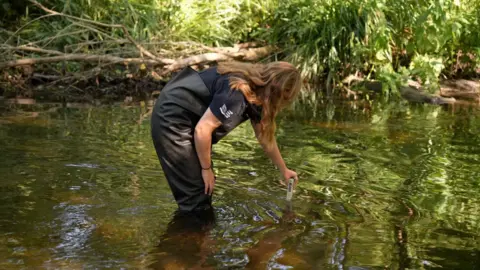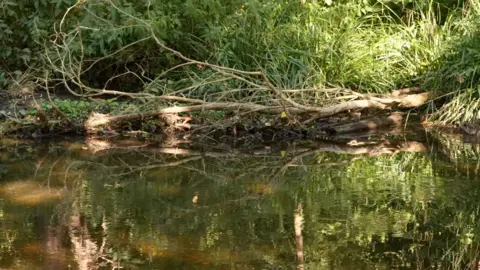Pollution 'through the roof' in heated rivers
 Yvette Austin/BBC
Yvette Austin/BBCThe health of rivers across south-east England is under growing threat as hot and dry weather has caused water levels to plummet and pollution to spike, according to the Angling Trust.
The charity warns that the UK's hottest spring on record coupled with pollution has pushed some rivers -including the River Medway in Kent and River Wandle in Surrey - to the brink.
Conservationists say low flows and concentrated pollutants such as ammonia and nitrates - that come from the likes of farming and sewage - have caused fish to die.
Alex Farquhar of the Angling Trust said the concentration of pollutants was "through the roof and that's what really matters to fish and ecosystems".
So far in 2025 up to 21 June, temperatures across rivers in England and Wales have been recorded at their highest since the trust began a nationwide citizen science monitoring project three years ago.
On the River Wandle, a chalk stream that runs through Surrey and London, water temperatures that typically range between 11C and 13C have soared to more than 20C in places this month, putting the fragile ecosystem under strain.
River temperatures in March, April, and May were significantly above average – up 1.8C higher than in spring 2023.
Even small increases have major consequences for species like wild brown trout and the endangered Atlantic salmon as warmer waters hold less oxygen, disrupt spawning, and intensify the toxicity of pollutants.
 Yvette Austin/BBC
Yvette Austin/BBCIn its latest report, the trust said the ecological consequences of this year's warm, dry conditions were already being seen in rivers across England and Wales.
So far in 2025, there have been 87 confirmed fish kill incidents, including those caused by pollution, low oxygen, and natural factors.
There have been 36 incidents of low flows so far this year- when river levels are reduced and pollution concentrations are high.
The Angling Trust's Water Quality Monitoring Network (WQMN), powered by volunteers, has this year registered record pollution levels.
On the River Medway in Kent 15 sites were tested at least eight times between July 2023 and July 2024.
Each one breached the upper limit for good ecological status, due to high phosphate levels.
Call for action
The warnings come as policymakers, regulators, and environmental groups gathered for a national summit this week to address the crisis.
Water companies, Ofwat, campaigners and government representatives discussed how to curb pollution and strengthen river resilience in the face of climate change.
River restoration expert Dr Jack Hogan said the future was "not looking good".
He said: "If things were to continue as they are, in the next couple of decades, many of our rivers are going to be too warm to support brown trout, so we increasingly will lose that iconic species."
The situation was "looking very grave," he said as the changing conditions were impacting life "all the way down the food chain".
Water Minister, Emma Hardy MP, declined an interview, but told audiences that the government was committed to improving water quality and ensuring security of supply.
She said: "We're looking to build new reservoirs. I've been round to visit some of them and see what's happening. And we want, by the end of this parliament, to have cut those sewage spills by half."
CEO of Ofwat, David Black, also declined an interview.
 Yvette Austin/BBC
Yvette Austin/BBCWater companies respond to criticism
Water companies said they were increasing investment in reducing storm overflows, upgrading infrastructure and further habitat enhancement to help improve the health of our rivers but acknowledged that the dry spring was having an impact.
The situation has drawn comparisons to the drought of 1992, when rivers like the Darent in Kent ran dry. Experts fear a repeat could be on the horizon.
Follow BBC Surrey on Facebook, or X. Send your story ideas to [email protected] or WhatsApp us on 08081 002250.
